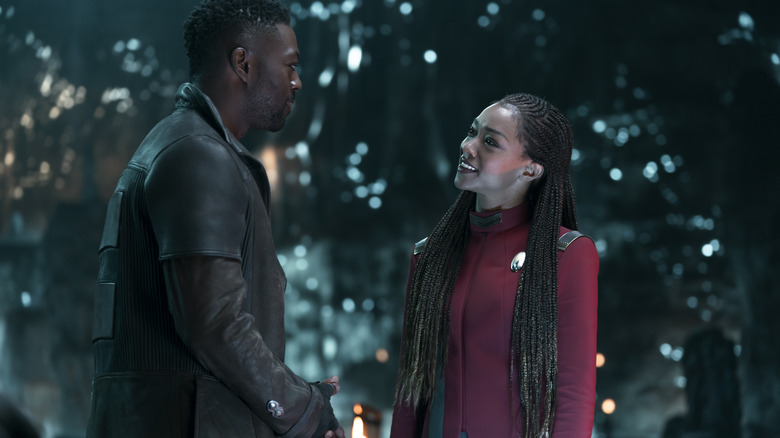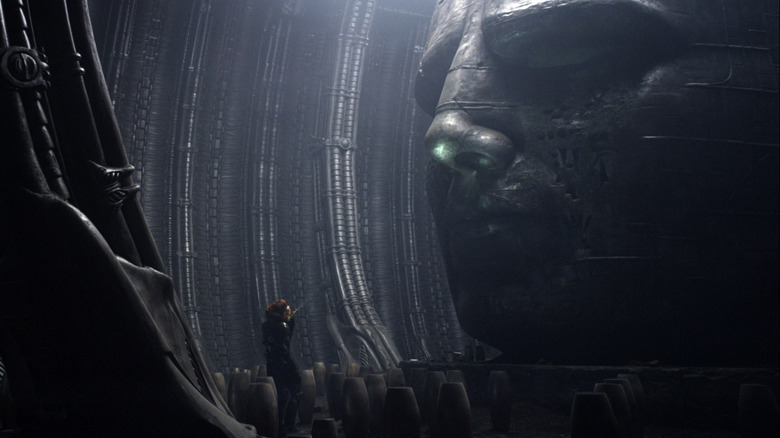Star Trek: Discovery's Final Season Is Sharing DNA With Another Iconic Sci-Fi Franchise
Warning: This article contains spoilers for episode 3 of "Star Trek: Discovery."
When it was announced that season 5 of "Discovery" would be its last, even the show's biggest and most loyal fans had to wonder exactly what showrunners Alex Kurtzman and Michelle Paradise might have up their sleeves for one final adventure. That turned out to be no small thing, following the reveal that they would be following in the footsteps of a game-changing storyline in the canon first introduced in "The Next Generation" – the so-called Progenitors and their role as, essentially, the creators of all sentient humanoid life in the galaxy. At its heart, "Trek" has always concerned itself with the most high-minded of ideas, routinely posing existential questions and philosophical debates. But as Captain Michael Burnham (Sonequa Martin-Green), Book (David Ajala), and everyone else on board the USS Discovery race against time to put the pieces together for a map that leads to the most important find in the history of civilization, the franchise is boldly wading into waters rarely explored before.
Perhaps that's why, more and more, this final season appears to be sharing quite a bit of DNA with a very different sci-fi series: specifically, director Ridley Scott's "Prometheus."
Nobody would ever mistake the dark, horror-focused, and downright pessimistic "Alien" franchise for the bright and sunny idealism of "Trek," mind you, but nor can anybody deny that the 2012 prequel film trafficked in very similar thematic territory. Humanity in the future following carefully laid clues to the origins of life as we know it? All while our protagonists must reckon with issues of faith and meaning? The Discovery might not be headed to as violent an end as the crew of the Prometheus (hopefully, at least), but we're downright intrigued by the parallels.
Beginnings and ends
Science fiction has always been a genre where we could ask ourselves the big questions: why are we here and what does it all mean? Last week's episode of "Discovery" is bookended by scenes of Captain Burnham reflecting on meaning and purpose, two core facets of her identity that have come undone following the revelation of the Progenitors. Where her duties to Starfleet once provided all the answers she could ever need, her latest mission has thrown everything she once thought she knew into total disarray. The first act of "Prometheus" isn't very different from this, focusing on scientists Elizabeth Shaw (Noomi Rapace) and Charlie Holloway (Logan Marshall-Green) whose initial enthusiasm and earnest willingness to explore the origin of the human species feels right at home with any Starfleet officer.
How these two properties go about tackling these similar themes couldn't be more different, of course, but there's unquestionably a shared ancestry and a common driving force behind these respective concerns. Few (if any) Trekkies went into this fifth and final season of "Discovery" anticipating lines to be drawn between the Progenitors and the Engineers — two sets of bald-headed weirdos from mind-bogglingly advanced societies whose motivations and worldviews may be entirely beyond our capacity to grasp. But where "Prometheus" and "Alien: Covenant" reached the conclusion that some things simply can't be understood without coming at the cost of our own humanity, "Discovery" appears to be setting up a season-long arc about the merits of bravely facing the esoteric and unknown, striving at all costs to find common ground and mutual understanding. And the key, as proven demonstrably by episode 3 and its focus on Trill, is to do so together.
New episodes of "Star Trek: Discovery" stream on Paramount+ every Thursday.

